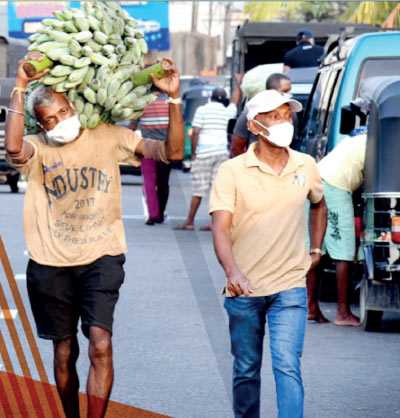Wednesday Feb 25, 2026
Wednesday Feb 25, 2026
Monday, 12 April 2021 03:34 - - {{hitsCtrl.values.hits}}
 Despite the heavy toll of the COVID-19 pandemic on Sri Lanka’s economy and the lives of its people, the economy will recover in 2021, though challenges remain, says the latest World Bank Sri Lanka Development Update: Economic and Poverty Impact of COVID-19 released on Saturday.
Despite the heavy toll of the COVID-19 pandemic on Sri Lanka’s economy and the lives of its people, the economy will recover in 2021, though challenges remain, says the latest World Bank Sri Lanka Development Update: Economic and Poverty Impact of COVID-19 released on Saturday.
The Sri Lanka Development Update (SLDU) notes that the country, hit with an unprecedented economic downturn due to the pandemic, is now on the road to recovery. Sri Lanka’s economic growth is expected to recover to 3.4% in 2021, mainly due to foreign investments as well as normalising tourism and other economic activities. However, the slow global recovery, coupled with continued trade restrictions, economic scarring from the slowdown, and the high debt burden may continue to affect growth.
The report provides an update on Sri Lanka’s economy and outlook, highlighting the devastating impact of the pandemic. Sri Lanka’s economy contracted by 3.6% in 2020, the worst growth performance on record, as is the case in many countries fighting the pandemic.
Government acted decisively with steps such as cash transfers and postponed tax payments. The Central Bank’s introduction of a debt moratorium and other measures to encourage lending also helped reducing the adverse impact of COVID-19 on businesses and livelihoods. At the same time, increased expenditures and lower revenues amidst the pandemic contributed to a deterioration of the fiscal situation. Public and publicly guaranteed debt is estimated to have increased to 109.7% of GDP. Reserves declined to an 11-year low in February, and the exchange rate depreciated by 6.5% from January through 17 March. Striking a balance between supporting the economy amidst COVID-19 and ensuring fiscal sustainability remains a key challenge.
The World Bank emphasised the need to striking a balance between supporting the economy amidst COVID-19 and ensuring fiscal sustainability as key. A reform program to provide a fiscal anchor could help Sri Lanka to reduce debt vulnerabilities and lower sovereign risk, it added.
“As in countries around the world, COVID-19 has had an unprecedented impact on Sri Lanka’s economy and people’s livelihoods, but we are already seeing positive signs as the country enters the recovery phase,” said World Bank Country Director for Maldives, Nepal and Sri Lanka Faris. H. Hadad-Zervos. “Through an enhanced focus on an export-oriented growth model that taps the full potential of private investment, Sri Lanka could increase its competitiveness and raise growth in a sustainable manner.”
The update includes a special focus section, which discusses the impact of COVID-19 on poverty. With jobs lost and earnings reduced, especially in urban areas and among private sector employees and informal workers, the $ 3.20 poverty rate is projected to have increased from 9.2% in 2019 to 11.7% in 2020.
The report notes that the current social protection system could support the reintegration of those who lost their jobs. It suggests that a more targeted social safety nets could help the authorities to scale up support to the poor and vulnerable quickly and effectively in times of crises. Investments in digital technologies and literacy can also help Sri Lankans find new economic opportunities.
The Sri Lanka Development Update is a World Bank publication that discusses the country’s recent macroeconomic developments and outlook, as well as relevant development challenges. It also provides a more in-depth examination of selected economic and policy issues.
The Sri Lanka Development Update is a companion piece to the South Asia Economic Focus, a twice-a-year World Bank report that examines economic developments and prospects in the South Asia region and analyses policy challenges faced by countries. The Spring 2021 edition titled South Asia Vaccinates, launched on 31 March, shows that economic activity in South Asia is bouncing back, but growth is uneven, recovery remains fragile, and the economic outlook is precarious. The report also focuses on the different dimensions of vaccine deployment and provides a cost-benefit analysis of vaccination in the region.